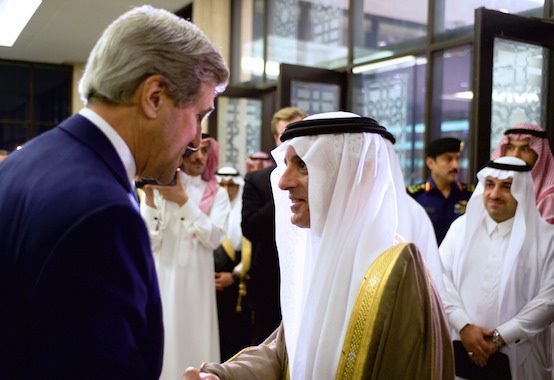Yemen Needs Peace, But the U.S. Isn’t a Credible Mediator

John Kerry was in Saudi Arabia this week, and called for a settlement in Yemen that would involve creating a new unity government:
U.S. Secretary of State John Kerry said on Thursday he had agreed in talks with Gulf Arab states and the United Nations in Saudi Arabia on a plan to restart peace talks Yemen with a goal of forming a unity government.
Yemen does desperately need peace, but it is unlikely to get it from the process Kerry is proposing. For one thing, the U.S. is now badly compromised as a mediator in any diplomatic process because of the extensive and continuing support that the U.S. provides to the coalition. The U.S. is and is perceived to be on one side of the war, and so any arrangement that our government favors is bound to be viewed with suspicion by the Houthis and Saleh as well as millions of Yemenis. It isn’t possible for the U.S. to be a credible broker between the warring parties when Washington has thrown its weight firmly behind the Saudis and their allies. That includes the backing the U.S. has given the Saudis at the U.N. when they have stymied all efforts to have an independent investigation of war crimes by all parties to the conflict. Kerry is personally a terrible messenger because of his repeated public statements in support of the coalition. He was also reportedly the strongest advocate inside the administration for backing the Saudi-led war:
Several American officials said that in the two days of White House discussions that followed Mr. Jubeir’s visit, Mr. Kerry was the most forceful advocate in arguing that the United States had an obligation to help the Saudis [bold mine-DL] at a time when the Iran talks had left the kingdom questioning America’s priorities in the region.
Given all this, whatever plan the U.S. devises along with Britain, the Saudis, and the UAE won’t be acceptable to Yemenis that have been living with the dire consequences of the Saudi-led, U.S.-backed intervention. As Peter Salisbury put it in his recent analysis, “the framework for peace will be issued not by neutral parties but four of the foreign countries most deeply entangled in the conflict, along with the UN’s top diplomat working in Yemen.” If the U.S. and Britain were willing to pressure the coalition to halt or at least scale back their campaign, that might create an opening for a political compromise, but the administration has shown no desire to do this. That could change, but the damage has already been done.
Kerry’s initiative is interesting insofar as it shows that the administration has started to be embarrassed enough by the Saudi-led coalition’s crimes that it is making some effort to resolve the conflict diplomatically. Unfortunately, the U.S. has already thoroughly wrecked any chance it might have had at being the author of a diplomatic solution when it became party to a conflict in which it had nothing at stake.
Comments